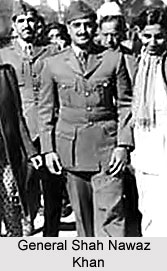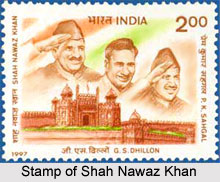 General Shah Nawaz Khan was an Indian freedom fighter and an officer of the Second Indian National Army (INA), also known as the Azad Hind Fauj under the leadership of Netaji Subhas Chandra Bose during the Second World War. He later became one of the three defendants in the first of the Indian National Army trials in the year 1946.
General Shah Nawaz Khan was an Indian freedom fighter and an officer of the Second Indian National Army (INA), also known as the Azad Hind Fauj under the leadership of Netaji Subhas Chandra Bose during the Second World War. He later became one of the three defendants in the first of the Indian National Army trials in the year 1946.
Early Life of General Shah Nawaz Khan
Shah Nawaz Khan was born on 24 January 1914 in the village of Matore in Kahuta, district of Rawalpindi (now in Pakistan) in the former British India. Captain Sardar Tikka Khan of Matore, his father served in the British Indian Army for almost 30 years. He received his education from the Prince of Wales Royal Indian Military College in Dehradun.
Military Career of General Shah Nawaz Khan
After the successful completion of his education, Khan was commissioned as an officer in the British Indian Army. In 1940, he volunteered to join the British Indian Army during the initial part of the war in Asia. He participated in the Battle of Singapore on 13 February 1942, but Khan was taken as a prisoner of war by the Japanese after the British army was overrun. He was rather reluctant to become a member of the initial the Indian National Army founded by Mohan Singh. But after the revival of the Azad Hind Fauj or Indian National Army under the leadership of Netaji Subhash Chandra Bose in Southeast Asia, Shah Nawaz Khan became an active member.
General Shah Nawaz in Indian National Army
General Shah Nawaz Khan joined the Indian National Army in the year 1943 under the command of Bose. He also became a member of the Cabinet of Arzi Hukumat E Azad Hind, meaning the Provisional Government of Free India, which was also known as Azad Hind (Free India). In September 1945, Subhash Chandra Bose selected a regiment that consisted of the top members of the army, who were sent to action to lead the advance into India. The regiment was known as Subhash Brigade and Khan was elected by Netaji Subhash Chandra Bose to command the troop. The Brigade took part in warfare in the Falam, Haka, Arakan, and in the locality of Kohima. Khan was appointed as number 1 Commander Division at Mandalay in December 1944.
During the operations, General Shah Nawaz Khan led the troop over 3000 miles. In the year 1945, he was arrested by the British forces and was sent to Red fort at Delhi for court martial. After the end of the war, Colonel Raja Habib ur Rahman Khan, Colonel Gurbaksh Singh Dhillon, Colonel Prem Kumar Sahgal and General Shah Nawaz Khan were put to trial in Delhi for waging war against the British Emperor. The prisoners potentially faced the death penalty, life imprisonment or a fine as punishment if found guilty. Jawaharlal Nehru, Bhulabhai Desai, Kailash Nath Katju Sir Tej Bahadur Sapru, Asaf Ali and others defended them and demanded that the soldiers of the Provisional Government of Free India should be treated as prisoners of war.
Political Career of General Shah Nawaz
 After the disestablishment of the Indian National Army, General Shah Nawaz Khan joined the Congress party. He contested the first Lok Sabha in the year 1952 from Meerut. He had a memorable parliamentary career and was appointed as-
After the disestablishment of the Indian National Army, General Shah Nawaz Khan joined the Congress party. He contested the first Lok Sabha in the year 1952 from Meerut. He had a memorable parliamentary career and was appointed as-
* Parliamentary Secretary and Deputy Minister of Railway and Transport (1952 to 1956) and (1957 to 1964)
* Minister of Food and Agriculture (1965)
* Minister of Labour, Employment and Rehabilitation (1966)
* Minister of Steel and Mines and Minister of Petroleum and Chemical Industries (1971 to 1973)
* Minister of Agriculture and Irrigation(1974 to 1975)
* Minister of Agriculture and Irrigation (1975 to 1977)
* Chairman of National Seeds Corporation Ltd
* Chairman, Food Corporation of India
The political career of Shah Nawaz Khan was ended after being defeated by the Janata Party in the year 1977. He served as the Head of Congress Sewa Dal until his death.
Shah Nawaz Committee
Major General Shah Nawaz Khan headed the committee that constituted by the independent government of India in 1956 to examine the conditions revolving the death of Netaji Subhash Chandra Bose. Suresh Chandra Bose, elder brother of Subhash Chandra Bose was also a member of the committee. The Shah Nawaz Committee started its work in April 1956 and completed after 4 months, when 2 out of the 3 members of the Committee, except Suresh Chandra Bose, stated that Subhash Chandra Bose definitely died in the airplane crash at Taihoku (Taipei), Formosa in Taiwan on 18 August 1945.






































